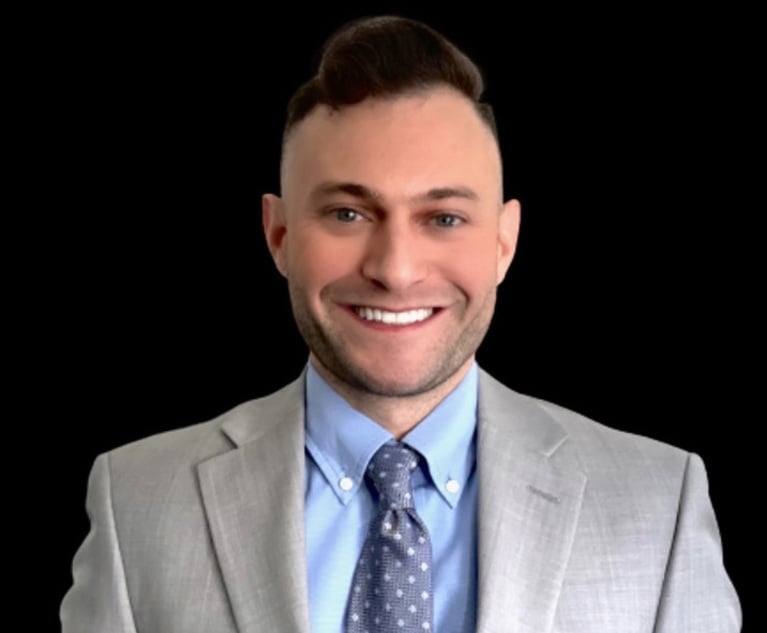California Ban of “Discretionary Authority” Clauses Applies to Health Insurance Plans, District Court Rules
A federal court has ruled that health insurance plans may not include provisions granting plan administrators discretionary authority to determine eligibility for benefits.
February 08, 2018 at 10:42 AM
5 minute read

FCS LEGAL This story is reprinted with permission from FC&S Legal, the industry's only comprehensive digital resource designed for insurance coverage law professionals. Visit the website to subscribe.
A federal district court in California, addressing an issue that neither the California Supreme Court nor the U.S. Court of Appeals for the Ninth Circuit had directly considered, has ruled that health insurance plans may not include provisions granting plan administrators discretionary authority to determine eligibility for benefits.
The Case
Mahlon D., an employee of RailWorks Corporation, participated in the company's employee welfare benefit plan, which was governed by the Employee Retirement Income Security Act of 1974 (“ERISA”). He said that his dependent, Emily D., who also was covered under the plan, was admitted to Change Academy at Lake of the Ozarks (“CALO”), a residential treatment facility, as part of her mental health care treatment. Mahlon D. asserted that although Emily D. was at CALO for 17 months, the plan administrator, Cigna Health & Life Insurance Company, only approved coverage for seven and a half months.
Mahlon D. and Emily D. contested Cigna's denial of benefits for the remaining nine and a half months.
Cigna Behavioral Health Inc., a Cigna subsidiary, reviewed and denied the appeal.
Mahlon D. and Emily D. appealed again, and Cigna's appeals unit upheld the denial of benefits.
Thereafter, Mahlon D. and Emily D. (the “plaintiffs”) sued Cigna, seeking to recover health insurance benefits under ERISA.
Prior to filing their briefs on the merits, the parties asked the district court to determine the applicable standard of review. Cigna contended that the standard of review should be abuse of discretion because the RailWorks plan contained a discretionary clause that gave Cigna, as plan administrator, discretionary authority to determine eligibility for benefits and the standard of review for a plan with a valid discretionary clause was abuse of discretion.
The plaintiffs, on the other hand, contended that the standard of review should be de novo, relying on a California law that banned discretionary clauses in certain insurance policies including disability insurance (the “state ban”) and contending that the Cigna health insurance plan was a form of disability insurance.
California Insurance Code
California Insurance Code Section 10110.6(a) provides:
If a policy, contract, certificate, or agreement . . . that provides or funds life insurance or disability insurance coverage for any California resident contains a provision that reserves discretionary authority to the insurer . . . to determine eligibility for benefits or coverage . . . that provision is void and unenforceable.
The District Court's Decision
The district court agreed with the plaintiffs and ruled that the standard of review of Cigna's decision was de novo.
In its decision, the district court found that, when read in the appropriate context, health insurance was a form of disability insurance for purposes of the California Insurance Code. Thus, the state ban on discretionary clauses applied to the Cigna plan.
The district court explained that disability insurance was defined broadly under the California Insurance Code to “include[] insurance appertaining to injury, disablement or death resulting to the insured from accidents, and appertaining to disablements resulting to the insured from sickness.” Cal. Ins. Code § 106(a). Moreover, the district court continued, health insurance – unlike both life and disability insurance – was not a separate class of insurance listed in the Insurance Code but, instead, was defined under the “disability insurance” chapter as “an individual or group disability insurance policy that provides coverage for hospital, medical, or surgical benefits.” Id. § 106(b) (emphasis added).
Therefore, the district court added, the definition of health insurance indicated that it was a type of disability insurance.
The district court was not persuaded by Cigna's argument that because the definition of health insurance excluded “[d]isability insurance, including hospital indemnity, accident only, and specified disease insurance that pays benefits on a fixed benefit, cash payment only basis,” health insurance was not a type of disability insurance. In the district court's opinion, this interpretation “render[ed] meaningless the explicit language” in Section 106(b) that health insurance was a “disability insurance policy.”
The district court added that a “more coherent reading” was that health insurance was a “smaller subset of disability insurance” that further excluded particular other types of disability insurance: namely, disability insurance that paid benefits “on a fixed benefit, cash payment only basis,” such as “hospital indemnity, accident only, and specified disease insurance.”
Accordingly, the district court concluded that the state ban's reference to “disability insurance” encompassed health insurance as a subset of disability insurance, that it rendered any discretionary provision in the Cigna plan void, and that the default de novo standard of review applied.
The case is Mahlon D. v. Cigna Health & Life Ins. Co., No. 16-cv-07230-HSG (N.D. Cal. Jan. 31, 2018). Attorneys involved include: For Mahlon D, Emily D, Plaintiffs: Katie Joy Spielman, David M. Lilienstein, DL Law Group, San Francisco, CA. For Cigna Health and Life Insurance Company, Defendant: Sean Patrick Nalty, LEAD ATTORNEY, Ogletree, Deakins, Nash, Smoak & Stewart, P.C., San Francisco, CA.
Steven A. Meyerowitz, Esq., is the Director of FC&S Legal, the Editor-in-Chief of the Insurance Coverage Law Report, and the Founder and President of Meyerowitz Communications Inc. As FC&S Legal Director, Mr. Meyerowitz, a member of the team that conceptualized FC&S Legal, provides daily analysis and commentary on the most significant insurance coverage law decisions from courts across the country and news regarding legislative and regulatory developments. A graduate of Harvard Law School, Mr. Meyerowitz was an attorney at a prominent Wall Street law firm before founding Meyerowitz Communications Inc., a law firm marketing communications consulting company.
This content has been archived. It is available through our partners, LexisNexis® and Bloomberg Law.
To view this content, please continue to their sites.
Not a Lexis Subscriber?
Subscribe Now
Not a Bloomberg Law Subscriber?
Subscribe Now
NOT FOR REPRINT
© 2025 ALM Global, LLC, All Rights Reserved. Request academic re-use from www.copyright.com. All other uses, submit a request to [email protected]. For more information visit Asset & Logo Licensing.
You Might Like
View All

Once the LA Fires Are Extinguished, Expect the Litigation to Unfold for Years
5 minute read
'Pull Back the Curtain': Ex-NFL Players Seek Discovery in Lawsuit Over League's Disability Plan

Insurers Dodge Sherwin-Williams' Claim for $102M Lead Paint Abatement Payment, State High Court Rules
Trending Stories
- 1States Accuse Trump of Thwarting Court's Funding Restoration Order
- 2Microsoft Becomes Latest Tech Company to Face Claims of Stealing Marketing Commissions From Influencers
- 3Coral Gables Attorney Busted for Stalking Lawyer
- 4Trump's DOJ Delays Releasing Jan. 6 FBI Agents List Under Consent Order
- 5Securities Report Says That 2024 Settlements Passed a Total of $5.2B
Who Got The Work
J. Brugh Lower of Gibbons has entered an appearance for industrial equipment supplier Devco Corporation in a pending trademark infringement lawsuit. The suit, accusing the defendant of selling knock-off Graco products, was filed Dec. 18 in New Jersey District Court by Rivkin Radler on behalf of Graco Inc. and Graco Minnesota. The case, assigned to U.S. District Judge Zahid N. Quraishi, is 3:24-cv-11294, Graco Inc. et al v. Devco Corporation.
Who Got The Work
Rebecca Maller-Stein and Kent A. Yalowitz of Arnold & Porter Kaye Scholer have entered their appearances for Hanaco Venture Capital and its executives, Lior Prosor and David Frankel, in a pending securities lawsuit. The action, filed on Dec. 24 in New York Southern District Court by Zell, Aron & Co. on behalf of Goldeneye Advisors, accuses the defendants of negligently and fraudulently managing the plaintiff's $1 million investment. The case, assigned to U.S. District Judge Vernon S. Broderick, is 1:24-cv-09918, Goldeneye Advisors, LLC v. Hanaco Venture Capital, Ltd. et al.
Who Got The Work
Attorneys from A&O Shearman has stepped in as defense counsel for Toronto-Dominion Bank and other defendants in a pending securities class action. The suit, filed Dec. 11 in New York Southern District Court by Bleichmar Fonti & Auld, accuses the defendants of concealing the bank's 'pervasive' deficiencies in regards to its compliance with the Bank Secrecy Act and the quality of its anti-money laundering controls. The case, assigned to U.S. District Judge Arun Subramanian, is 1:24-cv-09445, Gonzalez v. The Toronto-Dominion Bank et al.
Who Got The Work
Crown Castle International, a Pennsylvania company providing shared communications infrastructure, has turned to Luke D. Wolf of Gordon Rees Scully Mansukhani to fend off a pending breach-of-contract lawsuit. The court action, filed Nov. 25 in Michigan Eastern District Court by Hooper Hathaway PC on behalf of The Town Residences LLC, accuses Crown Castle of failing to transfer approximately $30,000 in utility payments from T-Mobile in breach of a roof-top lease and assignment agreement. The case, assigned to U.S. District Judge Susan K. Declercq, is 2:24-cv-13131, The Town Residences LLC v. T-Mobile US, Inc. et al.
Who Got The Work
Wilfred P. Coronato and Daniel M. Schwartz of McCarter & English have stepped in as defense counsel to Electrolux Home Products Inc. in a pending product liability lawsuit. The court action, filed Nov. 26 in New York Eastern District Court by Poulos Lopiccolo PC and Nagel Rice LLP on behalf of David Stern, alleges that the defendant's refrigerators’ drawers and shelving repeatedly break and fall apart within months after purchase. The case, assigned to U.S. District Judge Joan M. Azrack, is 2:24-cv-08204, Stern v. Electrolux Home Products, Inc.
Featured Firms
Law Offices of Gary Martin Hays & Associates, P.C.
(470) 294-1674
Law Offices of Mark E. Salomone
(857) 444-6468
Smith & Hassler
(713) 739-1250






